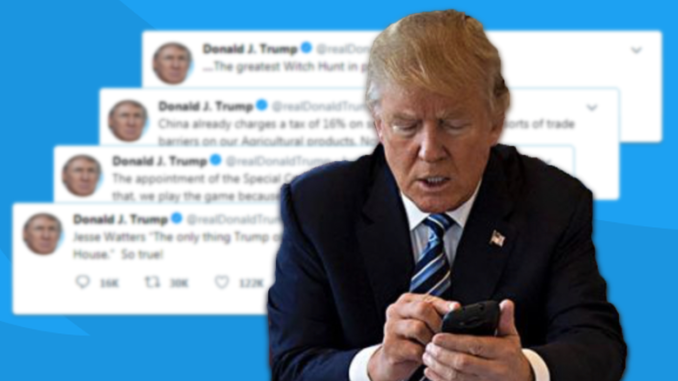
It’s Thursday.
Friday Eve.
Almost time for regular season Football and the World Series.
President Trump has tweeted two times so far.
Germany sells 30 year bonds offering negative yields. Germany competes with the USA. Our Federal Reserve does not allow us to do what we must do. They put us at a disadvantage against our competition. Strong Dollar, No Inflation! They move like quicksand. Fight or go home!
— Donald J. Trump (@realDonaldTrump) August 22, 2019
The Economy is doing really well. The Federal Reserve can easily make it Record Setting! The question is being asked, why are we paying much more in interest than Germany and certain other countries? Be early (for a change), not late. Let America win big, rather than just win!
— Donald J. Trump (@realDonaldTrump) August 22, 2019
The Kansas City Federal Reserve is hosting a 2019 Economic Symposium from Jackson Hole, Wyoming.
There are about 120 people expected to attend the closely watched event according to the Business Insider in attendance are, “central bankers, Federal Reserve system members, economists, financial organizations, academics, US government representatives, and members of the press.”
The symposium kicks off today, and runs until Saturday, with Fed Chairman Jerome Powell offering a key note speech on Friday.
According to IHS Market’s August Purchasing Managers’ Index (PMI) report, U.S. manufacturing registered at 49.9, which is below the neutral 50.0 threshold for the first time since September 2009.
The composite index “is based on original survey data from IHS Markit’s PMI surveys of both services and manufacturing.”
From the report:
New business received by manufacturing companies fell for the second time in the past four months during August. Although only marginal, the
latest downturn in order books was the sharpest for exactly 10 years. Latest data also signaled the fastest reduction in export sales since August 2009.Survey respondents indicated that a drop in sales often cited a soft patch across the automotive sector, alongside a headwind to manufacturing exports from weaker global economic conditions.
Meanwhile, manufacturing companies continued to trim their inventory levels in August, which was mainly linked to concerns about the demand outlook. Pre-production inventories fell for the fourth month running, while stocks of finished goods decreased to the greatest extent since June 2014.
PMI report 8/22/19.
IHS Markit Economics Associate Director Tim Moore said in a statement that “the most concerning aspect of the latest data is a slowdown in new business growth,” he added “its weakest in a decade, driven by sharp loss of momentum across the service sector.”
He went on to say that “Manufacturing companies continued to feel the impact of slowing global economic conditions, with new export sales falling at the fastest pace since August 2009.”
He concluded by saying business expectations for the year ahead became “gloomy,” for August, and are the lowest since 2012 when comparable data was first made available and that the slide in corporate growth, “projections suggests that firms may exert greater caution in relation to spending investment and staff hiring during the coming months.”
Dow turns negative, falling nearly 60 points https://t.co/7dyn6EWAw2 pic.twitter.com/KzqtEiZXZD
— CNBC Now (@CNBCnow) August 22, 2019
CNN's @vyurkevich reports the US Steel announcement that it will temporarily lay off 200 workers in Ecorse, Michigan, has left many in the community confused and shocked https://t.co/qWhOClCWlU pic.twitter.com/OyJZ8o4O7e
— CNN Business (@CNNBusiness) August 22, 2019
Key recession signal, the yield curve, inverts for third time since last Wednesdayhttps://t.co/q3mr1AuGWk pic.twitter.com/7rdC9y8zQj
— CNBC Now (@CNBCnow) August 22, 2019
From the tweeted article.
The main part of the yield curve inverted once again on Thursday as the yield on the benchmark 10-year Treasury note traded under that of the 2-year note, the third time the recession indicator has been triggered since last Wednesday.
Shortly after 10 a.m. ET, the yield curve turned negative and has remained that way. As of 10:19 a.m. ET the 2-year Treasury yield was at 1.601% while the 10-year yield was below it at 1.597%.
Such an inversion is viewed by many fixed-income traders as a sign of future recession, though forecasting the timing of an eventual downturn is a tougher task.
CNBC News.
This apparently came after Kansas City Federal Reserve President and the Philadelphia President told CBNC News that they don’t see a case for more interest rate cuts.
As the article notes “inversions of that part of the curve have predated every recession over the past 50 years while the last five 2-10 inversions have all led to recessions.”
The US economy created half a million fewer jobs last year than previously thought https://t.co/onTp893fPF pic.twitter.com/7KyPCuuFfe
— CNN Politics (@CNNPolitics) August 22, 2019
According to the article:
The Labor Department is revising down the number of jobs that employers added to payrolls by 501,000 during the 12-month period that ran from April, 2018 through March of this year. The government initially estimated the economy added 2.5 million jobs during those 12 months, or just over 200,000 a month. Now it appears it will be closer to 170,000 a month on average.
CNN 8/22/19.
Huh, and here I thought trade wars were easy to win.
This post will be updated within reason.
